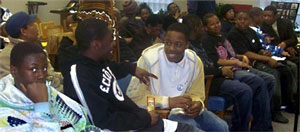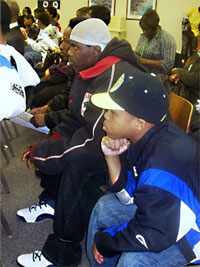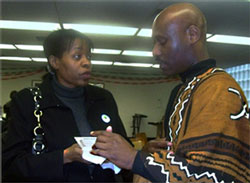By Richard Muhammad
Contributing Editor

CHICAGO (FinalCall.com) – Phillip Jackson was blunt: The first-class prisons are there, the juvenile offender lock-ups are there, but first-class education and opportunity are not available for young Black males.
The executive director of the Black Star Project said the Black community needs to come together and demand much more for its male children than what is being delivered.
“They got a lot of rooms here in Chicago where when you come in talking about wanting to save young Black boys, they make you apologize,” Mr. Jackson said. “I’m happy to be in a room where you don’t have to apologize for wanting to save Black boys.”
The room at Park National Bank was full of young Black males joined by adults, girls and staff members from Teamwork Englewood, which sponsored the session that included guest speakers, dinner, music, entertainment and an opportunity.
The aim was to recruit 100 young men to participate in the African American Male Initiative through four neighborhood groups. Resources for the effort come from the United Way of Chicago. Judge Louis Nixon was the keynote speaker.
Teamwork Englewood is a non-profit that works on comprehensive community development, which includes partnering with neighborhood groups to tackle everything from housing, to truancy to gangs and youth development.
Two years ago, tragic shootings of two young girls brought major attention to Englewood, which has struggled with poverty, violence and drugs. Teamwork Englewood and its community champions are tackling tough issues and committed to rebuilding the area.
Seeking a model for success

Each Teamwork Englewood partner – Englewood United Methodist Church, the Peace Center, Boulevard Arts and West Englewood United Methodist Church – will take in 25 young men and offer a quality experience aimed at helping them succeed, explained Johnnie Muhammad of Teamwork Englewood, who also served as the evening’s emcee. He is project manager for the initiative.
The goals are to help boys succeed in school and avoid drugs, gangs and violence, said Mr. Muhammad. Chicago is part of a United Way national pilot program trying to “rescue Black boys from the tragedy we’ve been seeing the last 20 years,” he said.
Mr. Muhammad likened the plight of Black males in Englewood to navigating a dangerous maze fraught with poverty and neglect. Nationally more than one-half million Black men are behind bars, versus only 40,000 Black men who will earn college degrees this year, he said.
The initiative uses a two-pronged approach to intervene in the lives of boys ages 10 to 16. It offers mentoring and tutoring on the school side and “constructive engagement” outside of school, including recreation and physical and cultural activities that keep them away from the lure of gangs and drugs.
The national initiative is about two-years-old. The Englewood pilot was launched a few months ago, but the number of participants has been small. The April 11 evening program was designed to recruit more boys, said Mr. Muhammad.
Each neighborhood partner emphasizes a different kind of activity to enrich young lives. Some offer creative and potentially entrepreneurial outlets, like music and CD-making, while others focus on developing talents for the visual arts and dance, or employ cultural activities to deepen self-knowledge and respect, he said.
United Way plays a key role as a funder and through technical support to Teamwork Englewood’s partners. The principal donors and overseers of the initiative are successful Black corporate execs or self-made businessmen who desire to see Black boys succeed.
‘We’re all in this together’
“We think at the end of the day, it will be a demonstration of how you can successfully intervene in the lives of Black boys,” Mr. Muhammad said.Intervention is based on care, concern and creating environments that nurture the boys, he said.
Adrienne Brooks, of the United Way, explained how in 2004 the non-profit asked groups and individuals what was needed to improve neighborhoods. The overwhelming response was: “We need help with our boys,” said Ms. Brooks.

That led to creation of the African American Male Initiative, which includes projects in four Chicago communities, including Englewood. “The whole point of the initiative is to help boys become successful adults,” she said.
When Ms. Brooks spoke she shared her personal story and the range of existence for Black men in her family. Some are doing well, working as educated professionals and enjoying good lives, she said. Others have suffered mental breakdowns and incarceration, Ms. Brooks added.
The core group of Black males behind the project have similar experiences and worry about boys and men who aren’t making it, she said. “It is a problem we cannot ignore,” Ms. Brooks said. “We’re all in this together.”
Part of United Way’s hope is that other funders will see a successful model and come forth to support more focus on Black males, she said. Funding for the African American Male Initiative is earmarked for five years.
Mr. Jackson said efforts like the initiative are critical. The key is to educate, organize, mobilize and take action, he said. The Black Star Project focuses on education and positive action to save Black boys and men and rebuild families. Young Black men in Chicago have to know the odds are against them, from unemployment to school drop out and incarceration, Mr. Jackson said.
Only 35 percent of young Black males in Chicago will graduate high school and only three of 100 Black freshmen will receive a college degree by age 25, he added.
Mr. Jackson stressed the long odds and the personal responsibility Black adults and youth must own up to. Clean up your community, raise your children, take care of your grandmother, don’t use drugs, don’t sell drugs, learn your history, respect women, rebuild your neighborhood, he exhorted the audience.
Mr. Jackson condemned corporate-sponsored music, film and videos that promote the destruction of Black men. He closed with a poem that described the Black struggle from slave ships to the streets of Chicago. “Even with all this pain and suffering, I ain’t mad, just don’t tell me every Black boy is bad,” he said.
Despite the dire statistics and the challenges, another essential message was delivered to the youth.“The people in this room are here to help you, they care about you, and they love you,” Mr. Muhammad said. “We believe it is easier to build strong Black boys than to fix broken Black men.”
A version of this story first appeared at www.teamworkenglewood.org.












